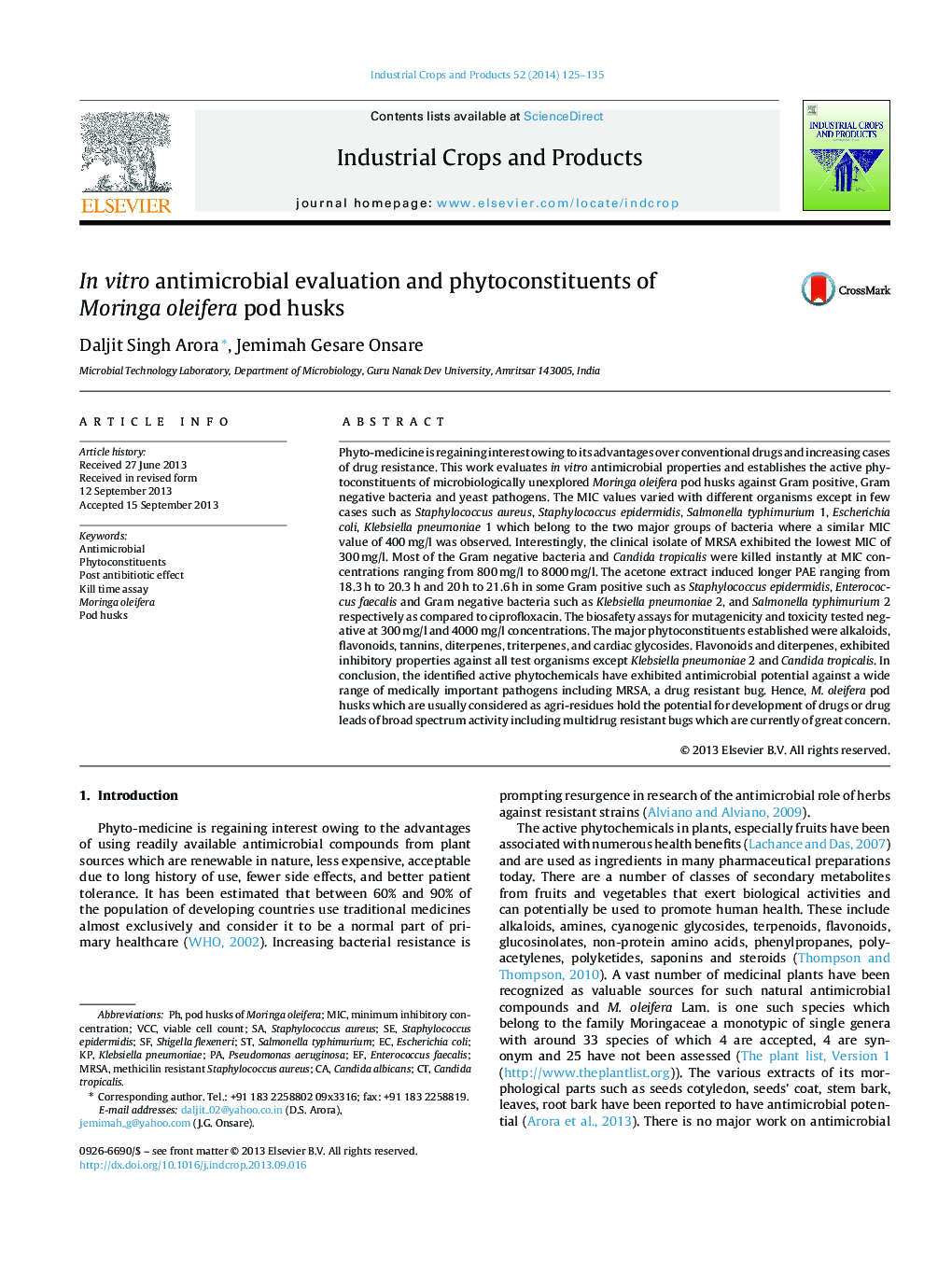| کد مقاله | کد نشریه | سال انتشار | مقاله انگلیسی | نسخه تمام متن |
|---|---|---|---|---|
| 4513415 | 1624857 | 2014 | 11 صفحه PDF | دانلود رایگان |
عنوان انگلیسی مقاله ISI
In vitro antimicrobial evaluation and phytoconstituents of Moringa oleifera pod husks
ترجمه فارسی عنوان
ارزیابی ضد میکروبی در محیط آزمایشگاهی و اسید فیتوکوئید در پوسته مورینگا اولیفرا
دانلود مقاله + سفارش ترجمه
دانلود مقاله ISI انگلیسی
رایگان برای ایرانیان
کلمات کلیدی
Candida tropicalisViable cell countVCCMICMoringa oleiferaStaphylococcus aureus - استافیلوکوک اورئوسMRSA - استافیلوکوک اورئوس مقاوم به متی سیلین یا MRSA Staphylococcus epidermidis - استافیلوکوکوس اپیدرمیدیسEscherichia coli - اشریشیا کُلیEnterococcus faecalis - انتروکوکوس فکالیسMinimum inhibitory concentration - حداقل غلظت مهاریSalmonella Typhimurium - سالمونلا تیفی موریومPseudomonas aeruginosa - سودوموناس آئروژینوزاAntimicrobial - ماده ضد میکروبی یا آنتی میکروبیالCandida albicans - کاندیدا آلبیکنسPhytoconstituents - گیاهان داروییKlebsiella pneumoniae - ﮐﻠﺒﺴﯿﻼ ﭘﻨﻮﻣﻮﻧﯿﻪ
موضوعات مرتبط
علوم زیستی و بیوفناوری
علوم کشاورزی و بیولوژیک
علوم زراعت و اصلاح نباتات
چکیده انگلیسی
Phyto-medicine is regaining interest owing to its advantages over conventional drugs and increasing cases of drug resistance. This work evaluates in vitro antimicrobial properties and establishes the active phytoconstituents of microbiologically unexplored Moringa oleifera pod husks against Gram positive, Gram negative bacteria and yeast pathogens. The MIC values varied with different organisms except in few cases such as Staphylococcus aureus, Staphylococcus epidermidis, Salmonella typhimurium 1, Escherichia coli, Klebsiella pneumoniae 1 which belong to the two major groups of bacteria where a similar MIC value of 400Â mg/l was observed. Interestingly, the clinical isolate of MRSA exhibited the lowest MIC of 300Â mg/l. Most of the Gram negative bacteria and Candida tropicalis were killed instantly at MIC concentrations ranging from 800Â mg/l to 8000Â mg/l. The acetone extract induced longer PAE ranging from 18.3Â h to 20.3Â h and 20Â h to 21.6Â h in some Gram positive such as Staphylococcus epidermidis, Enterococcus faecalis and Gram negative bacteria such as Klebsiella pneumoniae 2, and Salmonella typhimurium 2 respectively as compared to ciprofloxacin. The biosafety assays for mutagenicity and toxicity tested negative at 300Â mg/l and 4000Â mg/l concentrations. The major phytoconstituents established were alkaloids, flavonoids, tannins, diterpenes, triterpenes, and cardiac glycosides. Flavonoids and diterpenes, exhibited inhibitory properties against all test organisms except Klebsiella pneumoniae 2 and Candida tropicalis. In conclusion, the identified active phytochemicals have exhibited antimicrobial potential against a wide range of medically important pathogens including MRSA, a drug resistant bug. Hence, M. oleifera pod husks which are usually considered as agri-residues hold the potential for development of drugs or drug leads of broad spectrum activity including multidrug resistant bugs which are currently of great concern.
ناشر
Database: Elsevier - ScienceDirect (ساینس دایرکت)
Journal: Industrial Crops and Products - Volume 52, January 2014, Pages 125-135
Journal: Industrial Crops and Products - Volume 52, January 2014, Pages 125-135
نویسندگان
Daljit Singh Arora, Jemimah Gesare Onsare,
